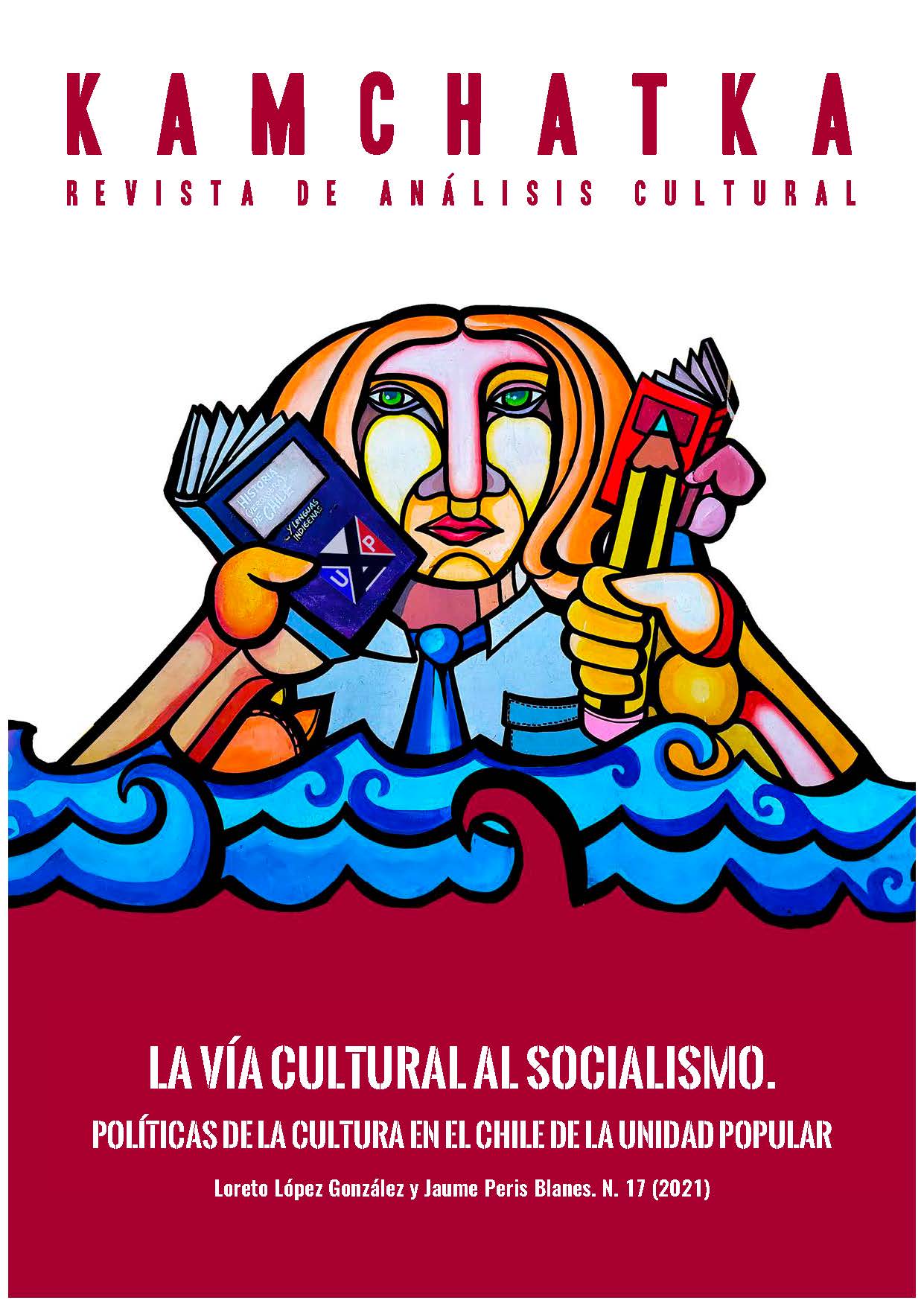Itinerary of a cosmoargentinian: Julio Cortázar and the Chile of Allende
DOI:
https://doi.org/10.7203/KAM.17.17617Keywords:
Julio Cortázar, Chile, Salvador Allende, culture and resistance, culture and power, creation and commitment Abstract
Abstract
A relatively unknown fact in Julio Cortázar’s life and creation trajectory, the period between 1970 and 1980 is marked by a strong involvement with “the Chileans”: first in support of the Chilean path towards socialism, then in the cultural resistance against Pinochet. Thus, we want to highlight in this work his commitment to the Chilean way to socialism in order to raise some questions about the notion of commitment itself. We will also explore the ideological evolution and theoretical positions of the Argentinian author about the place that culture should occupy in the emancipation of Latin American people. For this, we will focus both on studying the theoretical convergences between intellectual postures within the debate of the period, about the role of the intellectual in the revolution, and on giving a sample of the concrete actions in which his involvement was translated. All this will finally allow us to explain the cortazarian vision of creation as a “weapon to correct the future”
 Downloads
Downloads
 References
References
Allende, Salvador. “Periodismo y compromiso. Discurso pronunciado en la Conferencia Nacional de Periodistas de Izquierda”. Santiago de Chile, 10 de mayo de 1971.
Bianchi, Soledad (1995). La memoria: modelo para armar. Santiago de Chile: Centro de investigaciones Diego Barros Arana / Ediciones de la Dirección de Bibliotecas, Archivos y Museos Santiago de Chile.
Boldy, Steven (1996). “Julio Cortázar: gran cosmoargentino”. Fuentes, Carlos et alii. Visiones Cortazarianas. Historia, política y literatura hacia el fin del milenio. México, D.F.: Aguilar, Altea, Taurus, Alfaguara; Cátedra Latinoamericana Julio Cortázar; Ediciones Santillana: 29-56.
Bowen Silva, Martín. “El proyecto sociocultural de la izquierda chilena durante la Unidad Popular. Crítica, verdad e inmunología política”. Nuevo Mundo Mundos Nuevos (2008).
Canto Novoa Nadinne. “El lugar de la cultura en la vía chilena al socialismo. Notas sobre el proyecto estético de la Unidad Popular”. Revista Pléyade 9 (2012): 153-178
Cortázar, Julio. “No he venido como escritor sino como expresión de una ideología”. El Mercurio (07/11/1970).
Cortázar, Julio (2000). Cartas 1964-1968. Bernárdez, Aurora (ed.). Buenos Aires: Alfaguara.
Cortázar, Julio [(1969) 2004]. “Noticias del mes de Mayo”. Ultimo Round. Barcelona: Destino Libro.
Cortázar, Julio (2006). Obra crítica. Yurkievich, Saúl y Anchieri, Gladis (eds.). Obras Completas. Volúmen VI. Barcelona: Galaxia Gutenberg-Círculo de lectores.
Cortázar, Julio (2012). Cartas 1969-1976. Volumen 4. Bernárdez, Aurora y Alvarez Garriga, Carles (eds.). Buenos Aires: Alfaguara.
Cortázar, Julio [(1975) 2013]. “Presente del futuro”. Prólogo a Silva-Cáceres, Mardones Edgardo y Calvo, Jorge (eds.). La libertad no es un sueño, recopilación de poesía chilena de la resistencia: del exilio, cárceles, campos de concentración y poesía clandestina. Santiago de Chile: Signo Ltda: 6-7.
Cortázar, Julio. “El lenguaje no está a la altura de una revolución, el lenguaje es adocenado. Julio Cortázar en la Universidad Central de Venezuela”. Teoría y crítica literarias 1, (1976): 157- 172. En Cuadernos de Literatura XX, 39 (2016): 428-446.
Gobille, Boris (2018). Le Mai 68 des écrivains. Crise politique et avant-gardes littéraires. Paris: CNRS Éditions.
Lebeau, Elodie (2016). Le musée internacional de la résistance Salvador Allende en France (1975- 1991). L’odysée d’une collection d’art contemporain en exil. Memoria bajo la direccion de Evelyn Toussaint para la obtención del Máster en Historia, Arte y Arqueología de la Universidad de Toulousse.
Lihn, Enrique et alii (1970). “Política cultural y gobierno popular”. Revista Cormorán 8. Santiago: Editorial Universitaria.
Lihn, Enrique; Valdés, Hernán; Huneeus, Cristián; Ossa, Carlos y Wacquez, Mauricio (1971). La cultura en la via chilena al socialismo. Santiago: Editorial Universitaria.
Martínez, Tomás Eloy (1996). “Mito, Historia, Ficción: Idas y vueltas”. Fuentes, Carlos et al. (eds.). Visiones Cortazarianas. México: Ediciones Santillana: 109-131.
Montero, Rosa. “El camino de Damasco de Julio Cortázar”. El País semanal (14/03/1982). Fondo Cortázar Université de Poitiers y Archivos de El País semanal.
Revel, Judith (2006). Dictionnaire Foucault. París: Ellipses.
Ricoeur, Paul (2000). La mémoire, l’histoire, l’oubli. París: Seuil.
Santana, Joaquín. “La vuelta a Cortázar en 80 rounds”. Bohemia 63, 9 (26/02/1971): 4-9.
Skármeta, Antonio. “Cortázar: cita en la oscuridad”. Ercilla 1847 (10/12/1970): 69-73.
Urondo, Paco. “Cortázar y la política”. Panorama VIII, 187 (24-30/11/1970): 44-50.
Vicuña, Cecilia. “Andanzas de la “Tribu No” por este país que fuimos”. La Bicicleta 24 (1982): 26-27.
Vidal, Virginia. “No podía hoy estar lejos de los chilenos”. El Siglo (04/11/1970): 6.
Zeran, Faride y Waugh, Carmen (2012). La vida por el arte. Santiago de Chile: Lumen.
Downloads
Published
How to Cite
-
Abstract934
-
Artículo PDF (Español)590
Issue
Section
License
This journal provides an immediate free access to the content on the principle that freely make investigation available to the public, which promotes an increased global knowledge exchange.
Unless otherwise indicated, texts published in this journal are under the license Attribution-NonComercial 4.0 by Creative Commons. These texts may be copied, distributed and publicly communicated whenever the publication’s author and title are quoted and whenever they are not used for commercial purposes. In any case, intellectual property of the articles and its potential economic rights entirely belong to its authors.
The full license can be consulted on https://creativecommons.org/licenses/by-nc/4.0/. We encourage authors to disseminate papers published in Kamchatka. Journal of cultural analysis electronically, in institutional digital repository or in their websites.





